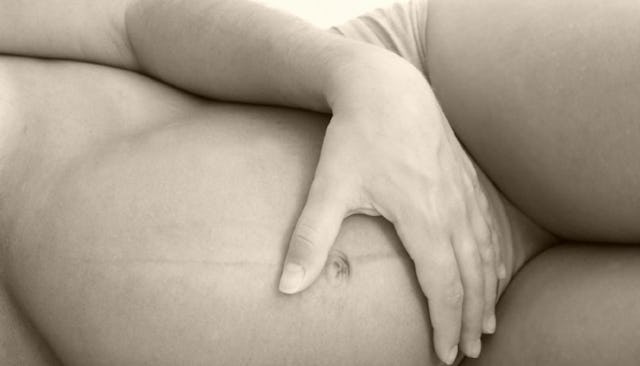All Pregnancies Are Not Created Equal

I was one of those pregnant women who everyone secretly hates. No morning sickness. No excessive weight gain. My skin glowed, my hair shined, and I felt like a million bucks. I’d walk every day, my basketball belly the only sign that I was harboring a human in my body. I loved everything about pregnancy. As excited as I was to meet my baby girl, I was sort of sad to give birth because I didn’t want to stop being pregnant. I didn’t understand why so many women complained about it.
Yep, I was that pregnant lady.
Fast-forward three years to my second pregnancy. I still had no morning sickness, but I did have a 3-year-old, which is almost the same thing. I still gained the optimal 30 pounds, still managed to exercise a bit, and still had that pregnancy glow. But this pregnancy was a little harder. We bought a house and moved when I was five months in, so I’m sure that had a lot to do with it. This time, I was ready to be done when the nine-month mark hit.
Fast-forward four more years to my third pregnancy. Still no morning sickness, though I occasionally had to hold back a small wave of nausea in the first trimester. Having known women who were vomiting daily their entire pregnancy, I knew that I had dodged a major bullet there all three times. But I wasn’t out of the woods.
Right around the beginning of my second trimester, I started noticing some pain in my lady parts. Not burning or irritation, but pain, like I’d slipped off the seat of an old 10-speed bike and racked my pubic bone on the cross bar. A shooting pain would hit when I spread my legs to get out of bed or climb into the car. If I stood too long, or walked too long, or sat in one position too long, it would hurt—badly.
As the months passed, the pain didn’t get better. Instead, it got worse. My doctor said it was just normal pregnancy pain, but I wasn’t convinced. I’d felt those weird, sharp round ligament pain bursts, and this wasn’t that. I’d felt the pressure of baby weight pushing down on my pelvic floor, and this wasn’t that. This was “I got kicked square in the crotch and my pubic bone is severely bruised” kind of pain.
So I turned to Dr. Internet and found dozens of women telling the same story, along with the name for my condition. It was called SPD—symphysis pubis dysfunction. Despite sounding like a sexually transmitted disease, SPD is a benign-but-excruciating condition where the ligaments in the pelvis relax too much, causing the pubic bones to separate. It causes wrenching pain, especially when lifting too much, walking too much, standing too long, sitting too long, and spreading your legs apart at all. In other words, it hurts to live your life.
Much like the joy of pregnancy hemorrhoids, it’s not exactly a condition you want to share with your neighbors. By month five, walking for longer than five minutes at a time resulted in horrendous pain that lasted most of the day. So despite barely looking pregnant, I had to drive one of those motorized shopping carts around the grocery store. I am sure people looked at my seemingly able and fit body and wondered why the heck I couldn’t walk around a store for 15 minutes, and I prayed no one would ever ask. What was I going to say? “Oh, my crotch is killing me today. Thanks for asking.”
Needless to say, by the time I was ready to give birth, I was ready to give birth. With my inability to exercise, I gained an extra 10 pounds during that pregnancy. My face got puffy, I felt like a blob, and I was in pubic pain for the better part of five months. But most notably, I was no longer that pregnant lady. I had joined the masses of women for whom growing a baby is a long, painful exercise in self-sacrifice and perpetual agony. I’d been initiated into the Pregnancy Misery Club. And as much as I wouldn’t want to experience that hoo-ha hell again, at least I gained some empathy for the women who loathe being pregnant. I really didn’t get it before.
Now that I know how different pregnancies can be, it’s easier for me to sympathize when a mom says she hates hers. If a pregnant woman says she can’t keep anything down, or she’s incapable of exercise, or she’s generally miserable, offer some sympathy—and for goodness sake, don’t brag about your perfect gestation.
All pregnancies are not created equal, so judge no mom until you’ve walked a mile in her comfortable shoes or driven her motorized grocery cart. Solidarity all the way, sisters.
This article was originally published on